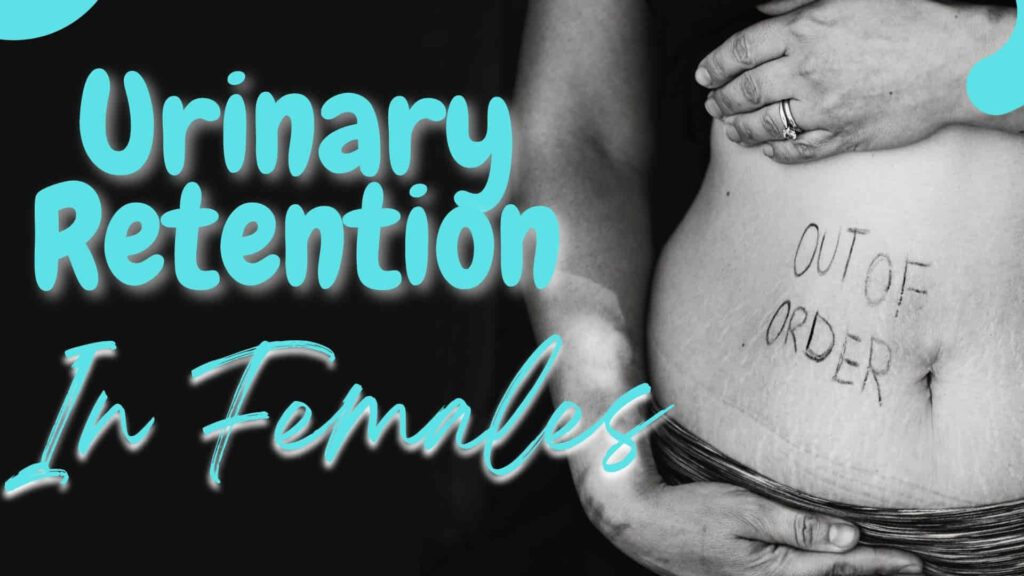Table of Contents
Introduction
Urinary retention is the Retention of urine inside the bladder and not being able to pass it outside due to any reasons (given below). Urinary Retention in females is nowadays becoming an emergency condition and may sometimes need prompt drainage or treatment.
Specifically, in Females, There can be two main causes
1. Obstruction to the urine flow:
The obstruction can be due to the following conditions:
- Causes Outside the Urinary system (Such as Uterus)
- Uterine Fibroids
- Uterine Tumours
- Ovarian Cyst
- Pelvic organ Prolapse
- After Anti-Incontinence surgery
- Due to medications such as Opiates, Heart medications, etc
- Urinary Tract infection
- Genital Herpes
- Constipation
- Causes Inside the Urinary system
- Stricture (Abnormal contraction of urethral muscles)
- Stenosis (Abnormal Narrowing of the urethral cavity
- Bladder Neck obstruction
- Stones
- Tumors
- Foreign body
- Complication after Child-Birth
2. Impaired bladder muscle function
- Age-related changes
- Uncontrolled Diabetes
- Nerve injury due to Surgery, Fracture of Lower Backbone, UMN(Upper Motor Neuron)Lesion, etc.
- Fowler’s Syndrome (Dysfunction of the urethral sphincter in Young Females )
Home remedies for urinary retention for females
- Consume Electrolytes in the form of fruit juices such as coconut water, Fresh and pure Pineapple juice, carrot juice. These can improve bladder and kidney function.
- Avoid constipating foods such as processed and deep-fried foods, artificial sweeteners, acidic and spicy foods.
- You can try to eat anti-inflammatory drinks such as Dandelion tea, Turmeric milk, etc. to ease out the swellings of the urethra.
The correct way to pass urine easily in urinary retention
- Sit on the toilet as usual on feeling the urge to urinate
- Relax the urethral opening normally
- Do not strain, relax the pelvic floor muscles also
- Lean forwards and relax your tummy, allow it to bulge forwards
- Allow the urine to flow
- If still you are not fully emptied then you can try to bend your upper body side-to-side while remaining sit.
- You can also apply some gentle pressure directly above your pubic bone to help increase the pressure
- If still there is not any improvement, you can stand up and move your hips in a circular direction and then try again the upper steps
Other Urinary retention treatments at home for females
- In some causes of retention, the doctor can give you Urethra relaxing medications such as Alpha-Blockers: Terazosin, Tamsulosin, etc. In cases of men, Medications that reduce the size of the prostate can also be given (Read more Here)
- Self Catheterization: The doctor can teach the patient to insert the tube themselves at their home.
- If the obstruction is caused by an infection, the doctor may prescribe you some antibiotics to cure the cause, pain relievers, and anti-inflammatories such as Ibuprofen and acetaminophen to decrease the inflammation and swelling.
Treatments for emergency urinary retention include
- Catheterization: the doctor will place a sterile flexible tube up into your urethra straight into your bladder. This tube will help the free flow of urine out of the body. This procedure can be uncomfortable and sometimes painful.
- Doctors can also perform catheterization through your lower belly with the help of a syringe injected directly into the bladder.
Urinary retention can also occur following a surgery:
This is scientifically known as Postoperative Urinary Retention (POUR)
- Anesthesia and medications in surgery can complicate the signaling pathways between the spinal cord and bladder muscle resulting in Urinary retention Presenting symptoms such as Pubic Pain, Fullness, Dribbling of urine, etc.
- Anesthetic medications do so because they are inhibitory to the nerves, that’s why they numb the person by not allowing the pain signals to reach their appropriate location in the brain.
- The most common culprit surgeries are Lower body surgeries such as Knee or Hip surgery, Large intestine surgeries, etc.
- However, Men are at higher risk (STUDY) for the development of Urinary retention whether it is due to normal causes or after surgery.
Treatment in Post-Operative Urinary retention includes Drainage of urine with the help of the Sterile tube (Foley’s Catheter) that will be inserted into the patient’s urethra. The patient must also be given some drugs that relax the urinary pathways i.e. Alpha-Blockers such as Terazosin, Doxazosin, Tamsulosin, etc. These medications can take Hours to days to reach their maximal effect so, drainage from the catheter is required till these medications kick in.
Do your child feels Breathlessness? Have a look at this article to know about causes of breathlessness in children




